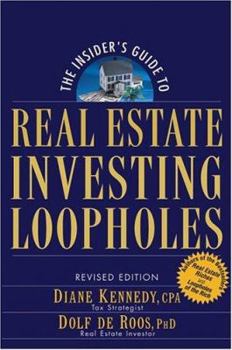The Insider's Guide to Real Estate Investing Loopholes
Increase Your Profits and Lower Your Tax Bill with Tax Loopholes for Every Investor The Insider's Guide to Real Estate Investing Loopholes reveals all the best and most effective tax loopholes that successful real estate investors use to maximize their profits. Completely updated with over fifty percent new material, this Revised Edition also covers all the new tax laws, and features new and updated case studies and examples. Real estate is probably the best investment money can buy, in part because there are so many profit-maximizing tax loopholes that directly benefit real estate investors. In this practical and straightforward real estate classic, bestselling authors Kennedy and de Roos show investors how to increase their investment profits and use real estate as a legal tax shelter. Inside, you'll find practical guidance and trustworthy advice on: * Tax loopholes that turn your home into a profit center * Tricks for using your vacation home as a tax-savings investment * Real estate investment strategies for taking advantage of international tax laws * Creative cash flow techniques for increasing your investment's profitability * How to cut taxes through the 1031 tax-free exchange, pension funds, real estate loss deductions, homestead exemptions, and joint tenancies * Real estate pitfalls and how to avoid them * And much more
Format:Paperback
Language:English
ISBN:0471711799
ISBN13:9780471711797
Release Date:March 2005
Publisher:Wiley
Length:240 Pages
Weight:0.69 lbs.
Dimensions:0.6" x 5.9" x 8.9"
Customer Reviews
5 ratings
How to Boost Returns with Tax Strategies
Published by Thriftbooks.com User , 18 years ago
Just about all of the advice in the book will help a real estate investor enhance his returns through smart tax planning. Saving money on taxes means more to the bottom line, which increases returns. This is not a rah-rah get pumped up to do deals type book, more of a step by step type explanation of how to best protect yourself (using LLC's or Corporations) and how to save on taxes (1031 exchange). They also touch on the relatively new TIC (Tenants in Common) structure, which is looking more and more useful because it will let partners out of a deal to do a 1031 without having to sell the whole property. Overall it's all stuff a real estate investor needs to know, but I personally would have liked more real life deal examples. In Dolf's 52 homes in 52 weeks there are lots of examples (52) of him doing deals with a breakdown of the profit or loss on each. By Kevin Kingston, author of: A 20,000% Gain in Real Estate: A True Story About the Ups and Downs From Wall Street to Real Estate Leading to Phenomenal Returns And my blog is: The Real Estate Investors Blog
Finding more tax loopholes
Published by Thriftbooks.com User , 19 years ago
I thought "Real Estate Investing Loopholes" was put together really well. It has a lot of information that will help you find the tax loopholes that will help you best. My favorite Chapter was "Be Paid to Live in Your Home", by having a home office I have been able to write off more expenses and pay less tax. It works. I highly recommend this book. Thanks Diane and Dolf.
Cashflow is key
Published by Thriftbooks.com User , 19 years ago
I just finished reading Real Estate Investing Loopholes and it is just simply brilliant! I have started investing for cashflow and already can see the benefits. What I have learned the most from your books is the importance of having a plan and due diligence. Thank you so much. Keep writing and we will keep reading.
Great source for Real Estate Information
Published by Thriftbooks.com User , 19 years ago
I really liked the chapter, Smart Business Structures That Reduce Risk and Tax. Now I think I better understand the differences between the possible structures and will be able to ask better questions when I am ready to start investing. Also, I like that this book has practical information and is not just trying to dazzle me with get rich quick nonsense. I would recommend this book to anyone who is interested in real estate.
better math needed from an accountant
Published by Thriftbooks.com User , 19 years ago
Page 202 says that 48 plus 15 equals 73. I have heard at least one other teaching tax accountant say that depreciation not taken will not necessarily be recaptured by the IRS upon sale of the property, in contradiction of Diane's claim. I liked the fact that she talks about paying by check. I also liked the fact that she admits there could be tenant resentment when they decide to forfeit non-refundable option consideration for whatever reason, and accordingly offers them some recoupment opportunity. Diane sticks with Robert Kiyosaki's definition of an asset- if a house appreciates $100k and cash flows 10K negative it is a liability. That surprised me. Most accountants would say the house is the asset and the encumbering loan is the liability. Other than those quibbles, the book is good.






